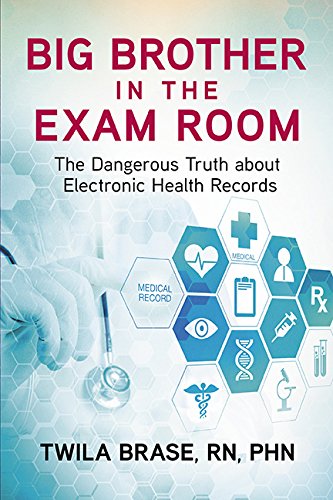Twila Brase co-founded the Citizens Council for Health Freedom in 1998. Since that time, Brase and her organization have become nationally recognized as leaders on the issues of privacy and government control in the healthcare industry. Brase recently published an important book “Big Brother in the Exam Room.” John Gilmore recently spoke with her about the issues addressed in it. The interview has been edited for length and clarity.
JG: Twila, congratulations on your new book. How did you come to write it?
TB: Ever since I founded CCHC the issue of privacy has been a concern. Both parties are responsible for taking away patients’ consent rights, moving away from medical privacy and giving away this data to everyone for their own purposes.
A big purpose of the book is to explain electronic health records (EHR). I don’t believe the American people understand what that is, that a surveillance system has been put in place in every exam room and at every bedside.
Until HIPAA (Health Insurance Portability and Accountability Act) is undone, anything else that is done with a claim to protecting our data and our privacy will not work. The only way to get back privacy is to undo HIPPA and restore patient privacy rights.
Fortunately HIPAA allows states to enact strong privacy laws and those privacy laws supercede HIPAA. My request is to the states to bring back privacy and control rights to the patients.
JG: Chapter Two of your book is “Congress Seizes Control of the Exam Room.” How did they do this and was it intentional or inadvertent?
TB: It begins with HIPAA: it took away our privacy and consent rights and enabled electronic health records to be imposed. In 2009 President Obama and the Democrat Congress imposed EHR saying doctors would not be fully paid for their Medicaid patients if they did not comply.
In 2015, Republicans imposed a new payment system that required the use of EHR. Through these two major laws, outsiders have been put in control of the exam room and have been given access to the data which allows the control of doctors.
JG: In other words, the legislation was intentional with respect to the control of our health care providers?
TB: Yes. Hillary Clinton’s plan would have created a national medical records system and would have mandated EHR together with HIPAA. She pulled it all together realizing that that’s what was necessary to create a national healthcare system. Obama knew the very same thing.
Within four weeks of his inauguration he and the Democrats imposed the EHR mandate. A year later they imposed Obamacare. They understood in order to socialize or create a national healthcare system, they needed to create a national health data system.
Unfortunately, Republicans have helped in this process of making the national data system and moving toward a national healthcare system.
JG: Republicans? Imagine my shock. In Chapter Three of your book, you talk about something I think would concern the average American: how EHR interferes with health care. How so?
TB: Many ways. EHR is a distraction to doctors. There is a process of assessing a patient and asking question. But the EHR forces the doctor to look into this box to think about the questions that the computer requires him or her to answer. The doctor is distracted.
Beyond that, the computer has other fields, other screens, doctors have to look at it. It’s got checklists and menus and everything that the doctor has to sort through. A doctor has a difficult time pulling together the full information about a patient because it’s scattered in disparate locations throughout the EHR.
Not only that, when a doctor has to issue an order, they have to sort through a list and hopefully find the one that they want. Sometimes the treatment they want isn’t even on the EHR, so they’re forced to jerry rig how they get to the treatment that they want.
Doctors’ treatments are all tracked. The doctor knows that their quality scores may depend on how compliant they are what the hospital or government wants them to be with certain treatment protocols.
The doctor, knowing that they are limited by those protocols, may choose rather than what they think needs to happen with the patient. Or they may spend more time figuring out following out those protocols and following those directives than actually figuring out what is wrong with the patient and doing a customized plan.
EHR doesn’t follow the workflow of patient care: it was never made for the doctor, it was never made for the patient. It interrupts and disturbs the way that a doctor would typically take care of a patient and record the information.
JG: Isn’t this is the tail wagging the dog?
TB: That’s correct. The EHR is a command and control system over what happens in the exam room. Patients don’t understand that; they just think it’s updated technology. EHR dictates to the doctor how the practice of medicine needs to happen. The computer dictates to the doctor.
JG: Your last chapter is “Future Considerations.” The last portion of it is “Steps Back to Privacy, Safety and Freedom.” What do you believe those steps are?
TB: I have four lists: one for Congress, one for state legislators, one for practitioners and one for patients/citizens. The whole purpose is to engage all of these individuals in opposing this move to a national health data system and therefore a national health system.
Patients in particular really need to start asking their doctors questions:
Is the treatment that you are giving me, the treatment that you are ordering, the treatment you think that I should have, or the treatment that the computer says I can have?


















